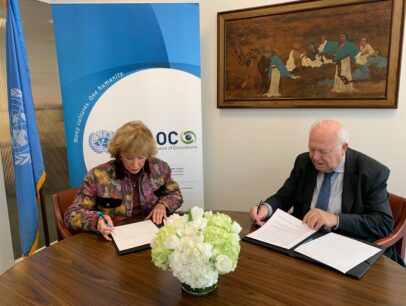The Women’s Alliance for Peace
Strengthening the role of women as peacemakers in situations with a sociocultural and religious dimension was identified as one of the pillars of the UN Alliance of Civilizations by H.E. Mr. Miguel Angel Moratinos soon after he took up his post as High Representative.

With the objective of identifying initiatives and actions to promote the role of women as negotiators and mediators in Africa, UNAOC and Fundación Mujeres por Africa, a Spanish non-profit organization which promotes women’s empowerment in Africa, established the Women’s Alliance for Peace (WA4P).
WA4P contributes to the implementation of the Sustainable Development Goals, in particular Goals 5, 16 and 17, and, more specifically, collaborates in initiatives and projects to support and strengthen the role of women as mediators and negotiators in situations with cultural and religious dimensions.
An Advisory Council to the Women’s Alliance for Peace, comprising prominent African women, was created to provide strategic direction; help identify priorities so initiatives and projects undertaken by WA4P provide value-added and complement other United Nations entities; and to leverage partnerships with relevant actors in the implementation of initiatives and projects.
Quick Links
Advisory Council to the Women’s Alliance for Peace: Bios (PDF)
Women’s Alliance for Peace Workshop Participants
UNAOC High Representative’s Remarks at the Women’s Alliance for Peace Advisory Council Meeting
14 May 2020
UNAOC High Representative’s Remarks at the Women’s Alliance for Peace Meeting with African Permanent Representatives
30 June 2020

Oumou Sall Seck (Mali)
Mali Ambassador to Germany

Hibaaq Osman (Somalia)
President of Al Karama

Caddy Adzuba (Democratic Republic of Congo)
Journalist

Wanjira Mathai (Kenya)
Chair of the Wangari Maathai Foundation

Aminata Toure (Senegal)
Former Prime Minister of Senegal

Obiageli Ezekwesili (Nigeria)
Former Minister of Minerals and Education

Catherine Samba-Panza (Central African Republic)
Acting President of the Central African Republic from 2014 to 2016

Valentine Rugwabiza (Rwanda)
Permanent Representative of Rwanda to the United Nations

Ellen Johnson Sirleaf (Liberia)
Former President of the Republic of Liberia and 2011 Nobel Peace Laureate

Aya Chebbi (Tunisia)
African Union Special Envoy on Youth; Former UNAOC Fellow
The first meeting of the Advisory Council was held in May 2020. On that occasion, members of the Advisory Council highlighted the importance of including women in decision-making in response to the COVID-19 pandemic; the role that African women can play in fostering solidarity and resilience as agents of change when it comes to addressing tensions and conflicts; and the importance of working with local women organizations focusing on mediation and peacemaking issues by providing them with training and capacity building. After the meeting, members of the Advisory Council sent a letter to the United Nations Secretary-General, expressing their support for his call for a global ceasefire and relaying their readiness to amplify the call in their respective activities and engagements.
In the course of 2021, Women’s Alliance for Peace established a network of women mediators from grassroots organizations in Mali and the Central African Republic (CAR). Participants bring diverse backgrounds and expertise in the field of mediation and are particularly interested in enhancing their skills as mediators at the local and national levels. An added value to this network is the fact that it encourages cross-fertilization between women mediators in the two countries.
An online workshop was conducted in early 2021 with the objective of fleshing out the priorities for women mediators in Mali and CAR. During the meeting, women themselves highlighted the following priorities:
- The inclusion of women in formal negotiation processes, including clear mandates;
- Addressing socio-cultural challenges; violence and insecurity; training in capacity-building, mediation, and conflict prevention;
- Moving from local mediation to mediation at the national and regional level;
- Sensibilization of authorities, religious leaders and other key actors about the role of women in mediation;
- Ownership and visibility;
- Developing a network of women mediators in Mali and CAR;
- Fostering international connections for grass-root women mediators in Mali and CAR.
WA4P Workshops
In the course of 2021, Women’s Alliance for Peace established a network of women mediators from grassroots organizations in Mali and the Central African Republic (CAR). To date, UNAOC and Fundación Mujeres por Africa have jointly conducted the following workshops:
19 May 2021
17 June 2021
1 July 2021
17 November 2021
26 January 2022

In accordance with the priorities of women mediators in CAR and Mali, these training online webinars have been conducted with particular focus on:
- Insecurity and sociocultural challenges in the context of the multidimensional crises in Mali and CAR.
- The role of religious and traditional actors.
- The role of women mediators in mediation processes at the local level.
- Mediator’s participation in peace and reconciliation processes.
- Mediation techniques.
The webinars are helping the participating grassroots organizations acquire further knowledge about mediation techniques, identify different actors involved in mediation, and address gaps and challenges those participating women face in their work. The workshops are also an opportunity for women to share information and good practices.

